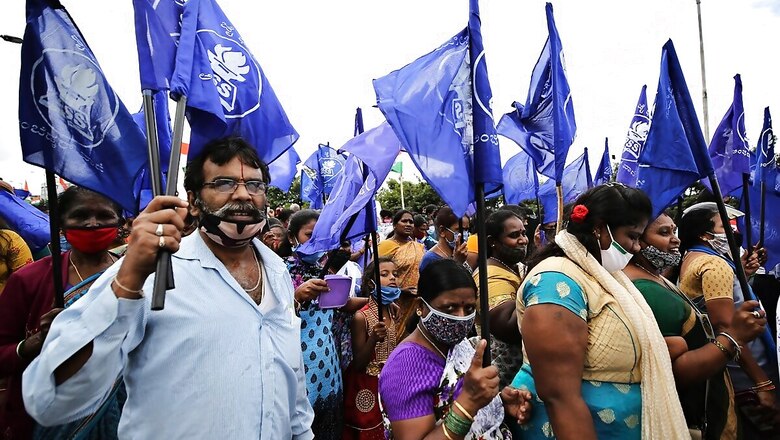After Farm Bills Go Through Rajya Sabha, Voices of Protest and Support Arise from Across the Country

views
On September 20, 2020, two farm bills were introduced in the Rajya Sabha that sparked a huge commotion among the opposition and ruling lawmakers.
The Centre says the bills were introduced in a bid to improve the overall condition of the nation’s farmers. According to the government, the income of the farmers would double by the year 2022. The bills also aim to provide farmers other benefits like the ability to sell their produce to whoever they want to and do business with big agricultural firms, Bharatiya Janata Party lawmakers say.
The proposed laws have still been facing significant opposition from several political parties and farmers’ organisations across the country.
Proponents are saying this is an urgent agricultural reform, the middlemen will be done away with, this is essential for the modernisation of agriculture, etc. However, detractors say the government is opening the door for corporates, and the interests of farmers are no longer protected.
Here are some voices in support of and against the move from across the country:
West Bengal
Farmer Sanjeev De Kabiraj, who owns a few bighas of land in Singur, said, “Now there is about 10 tons of paddy in stock. Currently, I have to sell it at a very low price. As a result of this agricultural reform, I will be able to sell in different places at a higher price than the minimum support price.”
Along with these hopes, there are also fears. Some say, “My land, my wish. Why should other people interfere?” Shailen Chandir, a farmer from Shantipur, said, “This is contract farming. There is no guarantee in this agreement. What will happen to those of us who cultivate on small plots of land and sell their produce in the local market? The traders will benefit from this. We will have nothing left.”
Anirban Pradhan, deputy director of the state cooperatives and agriculture department, said, “Initially, the lack of mandi culture may not be the reason for the pressure. But overall, there is a possibility of foul play. In this case, if any big private company wants to buy a product and keep it in cold storage, the government will not stop it. Due to the Essential Commodities Act, the government had the right to stop storage of excess goods earlier. Now that is no more the case.”
Rabin Banerjee, who has been working for the rights of farmers for many years, said, “Bengal farmers are not likely to be directly affected.” But he thinks that it might affect the middle-class people. He further said that in Bengal, buyers and sellers do not go to the mandis. As a result, the farmers will not face direct loss. But the loss will be different. Many grains are imported from other states. If the new bills become law, that grain will come with a condition. “Now, we can go to the grocery store and ask for Rs 2 worth of dried chillies. But, then it will not be possible. The government will charge 6 per cent GST for packing. No longer will we be able to buy as much as we need,” he said.
Chief minister Mamata Banerjee has declared that she and other members of the Trinamool Congress will protest against the two farm bills until they are withdrawn. The TMC chief also called on all parties to unitedly oppose the farm bills and assured her party’s support.
The Congress and the Left Front have also decided to hit the streets on September 25 against the Farmers’ Produce Trade and Commerce (Promotion and Facilitation) Bill, 2020, and the Farmers (Empowerment and Protection) Agreement of Price Assurance and Farm Services Bill, 2020.
Karnataka
Karnataka Congress has termed the bills “anti-farmer”. Many farmers’ unions have called for a nationwide bandh on September 25. Former Prime Minister and Rajya Sabha member HD Deve Gowda has asked Prime Minister Narendra Modi to explain the short-term and long-term benefits as well as consequences of the bills.
Several top local activist groups have called for protests and condemned the central government passing the bills. All these organisations are alleging that the Centre is acting at the behest of industrialists and capitalists and they are not protecting the core interests of farmers.
Kerala
“I do not trust the bills and agreements on agriculture as all of them have failed to protect the farmers’ interests in the past because none of them were prepared by the farmers, but by the market forces. When the agricultural business is turning market-centric, naturally the role of the government will dwindle and, in reality, it will be against the interest of the farmers. This will be the big impact on the farmers by the bills passed by the Rajya Sabha. The number of farmers, as well as the area under cultivation, are getting lower and lower in Kerala. This is evident from the decrease in the area of rice cultivation, one of the three major crops, besides coconut and rubber, in the past 50 years. The younger generation prefers some kind of a regular job or migrating to foreign countries as they find agriculture uneconomical as a daily business. Hence, the state may not witness many protests in this matter,” said Dijo Kappen, state vice-chairman, Kisan Maha Sangh
Maharashtra
“Maharashtra doesn’t have corrupt crop-procurement systems like Punjab and Haryana. Sugarcane and cotton are both important crops in the state. Both have good procurement systems led by the state government. The Maharashtra government already had open markets for farmers when Devendra Fadnavis’s government was in office. Here, farmers are used to free trade. They don’t feel any discomfort. So Maharashtra farmers are fine with the bills,” says Pasha Patel, former president of Commission for Agricultural Costs & Prices (CACP) Maharashtra.
Tamil Nadu
In Tamil Nadu, the ruling AIADMK supports the bills while the opposition DMK has called for a protest on September 28.
“The bills would ultimately drive farmers out of their landholdings and force them to quit agriculture. In spite of unfavourable conditions, nature’s fury and an unpredictable monsoon, agriculture and farmers, in general, had thus far been given protection to some extent by way of the minimum support price. With the new laws, the Centre was planning to do away with MSP for paddy, wheat and other produce,” said Maniarasan, farmers’ association leader.
CM Edappadi K Palaniswami says that many special aspects of these bills would benefit the farmers of Tamil Nadu. This would not affect the procurement of paddy based on the MSP. There will be no bar on the functioning of the farmers’ markets in Tamil Nadu, he says.
Telangana
After passing of the farm bills in the Rajya Sabha, some parties and the All India Kisan Sangharsh Coordination Committee (AIKSCC) decided to hold protests across the Telugu-speaking states. While the Andhra Pradesh government supports the bills, Telangana’s ruling party is opposing them. Telangana chief minister KCR says the Centre’s move is an injustice to the farmers.
“For public consumption, it was stated in the bills that farmers could sell their products anywhere in the country. But in reality, the bills would enable the traders to go anywhere in the country to buy the produce. The bills would also help the corporate lobby spread to all corners of the country and pave the way for private traders. They are saying that farmers can sell their products anywhere in the country with these new bills. But is it possible for farmers to take their small produce to long-distance areas bearing the heavy transport charges and sell it at a good price? These bills are nothing but a sugar-coated pill. This should be opposed at all costs,” the CM said.
While the Andhra government supports the bill, farmers’ organisations and Left parties held a demonstration in Vijayawada. Terming the two bills “anti-farmer” and “pro-corporate”, the All India Kisan Sangharsh Coordination Committee (AIKSCC), an association of 250 farmers’ organisations, called for Bharat Bandh on September 25.
“At the beginning of this month, the AIKSCC had written 100 letters to Prime Minister Narendra Modi, requesting a discussion on the farm bills with farmers’ organisations. There has been no response, and the government has passed the bills despite farmers’ outrage,” said Avik Saha of AIKSCC.
“We are demanding the immediate withdrawal of the two farm bills. Why didn’t the government send the bills to a select committee as urged by over 15 political parties? Instead, the bills were passed by a voice vote despite the opposition’s request for division of votes. It is Shameful that the YSRC Party and Telugu Desam Party competed in supporting the anti-farmer bills,” Saha added.
“Once the bills pave the way for corporate farming, small and marginal farmers will be gravely impacted. Corporates may even grab the lands of poor farmers in the name of contracts. The AIKSCC has also asked that the President must refuse and send back the farm bills,” said Sagar from the Telangana Rythu Sangham.
(With inputs from all language editors of respective states)



















Comments
0 comment